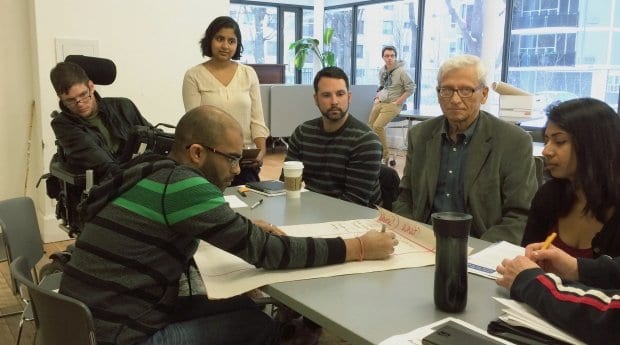Participants at a town hall meeting to discuss the city’s 2015 budget gave Ward 27 Councillor Kristyn Wong-Tam a clear direction to pursue more funding for separated bike lanes in the area and an upgraded walking and cycling path through the Rosedale ravine. Wong-Tam called the meeting at the 519 Church Street Community Centre to engage residents in a participatory budgeting process to find out what the community’s priorities are for infrastructure spending.
The bicycle paths and ravine improvements were just two of the ideas floated by the small group of attendees, but they were selected after successive rounds of run-off voting eliminated other proposals. Some of the other ideas included installing infrastructure on Chechalk Lane to support a public market, putting up new signs to illuminate heritage aspects of buildings and street names, installing outdoor exercise equipment in Moss Park and returning streetcar service to Church Street.
“Landlords should be compelled, or supported, to install some public education system where people are confronted with heritage,” says Connie Langille, who suggested the money be spent on “plaques, signs on laneways and community heritage maps.”
Participants were asked to propose permanent infrastructure improvements that could be built with approximately $2 million, for example, through community benefits paid by developers through Section 37 charges.
Although turnout was small for the event — only 14 people voted in the participatory budget exercise, most of them regulars at city planning events and members of nearby residents’ associations — Wong-Tam says the exercise was worthwhile as a first step in increasing civic engagement.
“It’s a place for us to start from and grow from,” she says. “We have 14 residents’ associations and five BIAs, and we meet with them monthly.”
Wong-Tam says that many ideas that came from the session are already being worked on by the city and her office, although she points out that the Church-Wellesley neighbourhood received a lot of attention over the past few years in preparation for last year’s WorldPride festivities.
In the near term, however, Village residents can expect greening improvements to Wood Street near Church Street Public School and repainting of the rainbow crosswalks that were installed last year for WorldPride but were destroyed shortly after during a water-main replacement project. Both projects are already funded by the city.
Wong-Tam says she’d like to “reprogram” Wellesley Street to give it a more consistent and welcoming design. “What we hope to do is reprogram the street and build out more tree-planting opportunities and opportunities for improvement with respect to granite pavers.”
She also notes that there is funding for a long-dormant project to animate the large sidewalk on the corner of Church and Alexander streets, which has not gone forward because residents of the adjacent building could not agree on a design. The corner became the source of controversy in 2011, when benches were removed over fears of violent drug dealers congregating around them at night.
Other improvements to the neighbourhood are on hold pending the completion of the Village Study, which the BIA and The 519 have been working on for more than a year. Wong-Tam says the BIA had been without a coordinator for several months and was unable to move forward on developing plans.


 Why you can trust Xtra
Why you can trust Xtra


